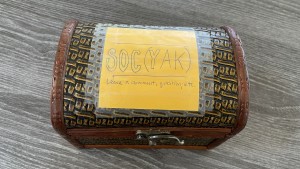As I sat down in my sociology theory class, Professor Villegas stood before the class with a new pedagogical innovation: SOC(YAK), a question box for the course. Having already taken my introductory sociology class with him I was familiar with his teaching style; he constantly encourages students to participate in class discussions and goes to great lengths to make sure we meet with him in office hours to talk about our work. This year, to ensure that no student questions go unanswered, SOC(YAK) was born. According to Professor Villegas, SOC(YAK) draws inspiration from Yik Yak, an anonymous messaging app that students at Kenyon use.
Professor Villegas opened the small brown treasure chest and handed out small pieces of paper for us to write our questions or thoughts on. Taking the paper, I wrote my initials in the upper right hand corner. While the class was discussing that day's reading, I jotted down a question. As I placed my comment in the treasure chest, Professor Villegas and I had a quick conversation before I exited the Cheever Seminar Room. Later that day, I received an email with the answer to my question.
I walk into Finn House for my next class with a question that I want to put into SOC(YAK). Professor Villegas enters the room and proceeds to pass out the blank pieces of paper. Once again, I jot my initials in the corner and write my thought down on the paper. As I leave class for lunch, I drop my note into the box. Later in the day, an email arrives responding to my thought. The process continues for the next couple of weeks.
One day, as I sit down for his lecture, I find that I have nothing for SOC(YAK). As class goes on, I find that I can’t muster up a nugget for the treasure chest. When 1:00 p.m. hits, I start to pack up. Professor Villegas walks over with the box, so that I can put my paper in there. “Nothing today,” I say. He seems surprised that I did not have anything—I almost always put a note in the box. Occasionally, we would stay and talk about my comment after class.
Later that week, I paid careful attention to the reading to see if I had any questions or thoughts. Walking into the seminar room, my mind filled with multiple nuggets to put into the treasure box. As class ended, I walked up to the front of the room to put my piece of paper into SOC(YAK). Professor Villegas noticed I had a lot of thoughts. As he read some of my comments, we started to talk.
These impromptu conversations after class are pure. Like going north on Saturday night, chatting after class with the professor is a spontaneous enjoyment. You don't know what is going to happen next, yet you're not nervous. Oftentimes, you end up leaving with a core memory.
The after-class conversation flows naturally. Unlike in office hours, where I am asking for help, there are no set topics. I can talk openly with a Kenyon professor. I feel like a sponge, ready to soak up all the knowledge that seeps out of the conversations. Every question I ask seemingly has an answer and usually a question back. As I put together my words, I can tell that I am starting to understand the course material more. As I start to bring some of my political science classes into the discussion, the conversation evolves to a more holistic one about broader society. The borders of the departments of study are broken down, revealing an overlap between disciplines.
As a double major in political science and sociology, I deeply appreciate the overlap between the two. At Kenyon, I can double major and have a concentration in public policy, but the academic value of college does not stop there. The lectures that the professors teach can at times cause a sense of mysticism to wash over me. The approaches taken to care for students is something that I was not prepared for.
The emails I get after class responding to my SOC(YAK) are not some hastily typed email by an assistant to the professor, but rather carefully thought out letters; the spontaneous conversations that I can have with professors after class invoke a sense of curiosity, for there are no boundaries to the topics that come up. In class, the discussions of readings can make it feel like you were there when the author was writing it.
While preparing for sociology class tomorrow, I make sure to come up with some questions and thoughts for SOC(YAK). I look forward to the thoughtful response from Professor Villegas. I still have a majority of my sociology major courses to complete. I know that Professor Villegas, like many other faculty members at Kenyon, cares deeply about how students learn. He introduced SOC(YAK) to make sure no questions went unanswered. As a result, I started to be able to have deeper conversations about the material as well as consistent emails responding to my thoughts.
While the small treasure chest only appears in my sociology class, I know that its presence is not just limited to that class. There is an invisible question box in most of my classes. All I need is a nugget to start the conversation.

